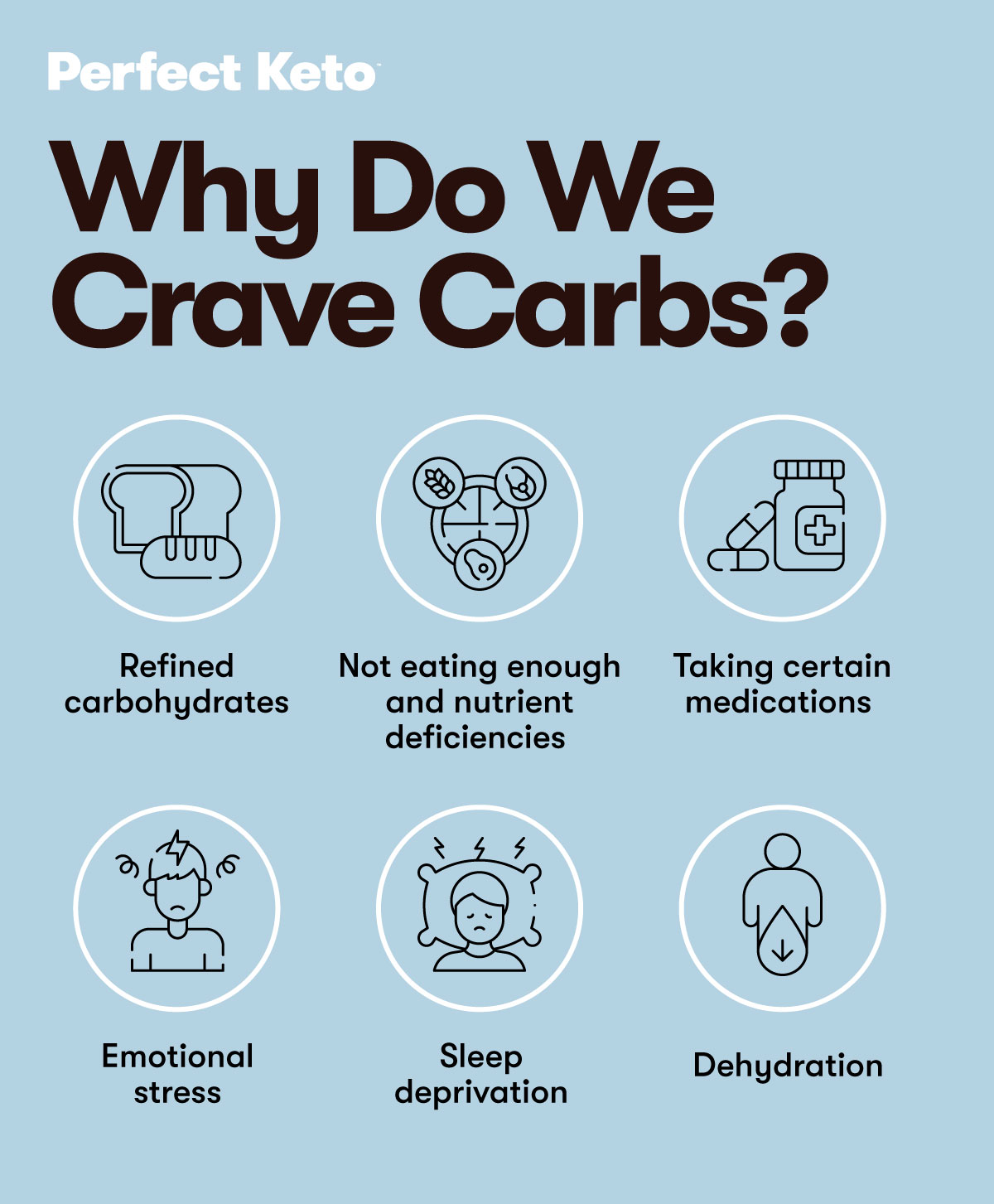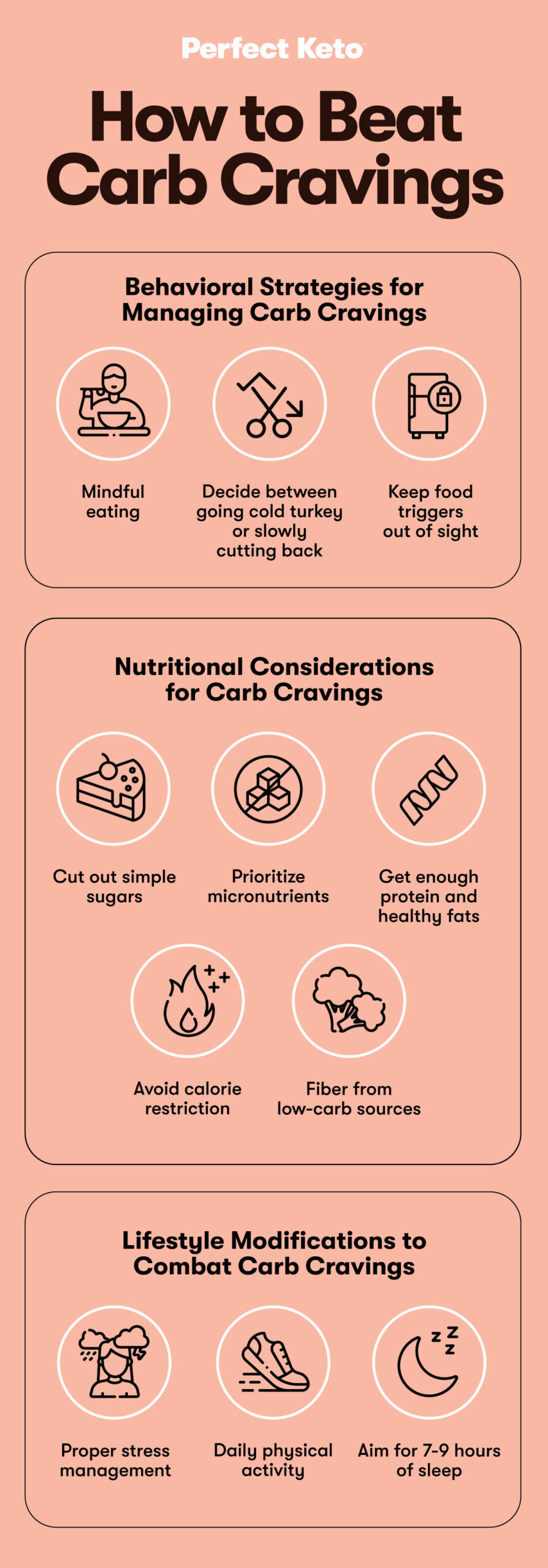There are many possible reasons why you’re always reaching for those candy bars and decadent desserts. A diet that’s high in simple sugars, too much stress, and sleep deprivation are some of the factors that increase carb cravings.
While we deal with them from time to time — and more frequently, for some people — overeating carbs has negative consequences. Learn what triggers the urge to eat them and more importantly, how to curb carb cravings for your overall health in this guide.
Why Do We Crave Carbs?
Here are essential points that will help explain what your carb cravings mean:
Refined carbohydrates
Refined carbs, also known as simple carbs or processed carbs, are mostly found in white flour, white bread, pizza dough, pasta, most breakfast cereals, and pastries. These carbs cause rapid spikes in your blood glucose after eating them. As a result, you’ll feel hungry sooner and eat them again (*).
Not eating enough and nutrient deficiencies
Feeling hungry all the time is a sign that you’re not consuming enough calories. Since carbs are a quick source of energy (from glucose), your body will crave them.
Calorie restriction can also mean that you’re already missing out on certain vitamins and minerals. Note that being deficient in micronutrients increases cravings for foods containing them — for instance, someone craving chocolate could imply a magnesium deficiency.
Taking certain medications
Medications used to treat depression — e.g. tricyclic antidepressants and selective serotonin reuptake inhibitors or SSRIs — improve a person’s mood, although it may lead to weight gain due to an increased appetite for more carbohydrates (*).
Over-the-counter (OTC) meds like antihistamines to relieve allergies may also stimulate appetite, contributing to weight gain (*).
Emotional stress
Being emotionally stressed due to a major life change or overwhelming responsibilities may trigger your intake of foods high in sugar, carbs, as well as fats. All three of them can be found in chocolates, ice cream, and biscuits.
One explanation is that increased stress levels can affect healthy food choices. Additionally, eating carbs from refined and simple sugars encourage serotonin production (*). Serotonin is a naturally occurring neurotransmitter that’s associated with positive feelings. This makes people more drawn to carbs to feel better.
Sleep deprivation
Sleep deprivation is another reason we yearn for carb-rich foods, especially the highly processed and energy dense ones. A study found that after being sleep-deprived, participants ate donuts, chocolate chip cookies, and potato chips (*).
Dehydration
There’s a reason why experts recommend drinking more water for beating carb cravings. Dehydration makes it challenging for your body to produce glycogen, which is the stored form of glucose. This is especially true when you’ve been exercising.

How Carb Cravings May Negatively Impact Your Health
Excess carbohydrate intake due to those cravings can affect your health in different ways. It increases your blood sugar levels, triggering an insulin response. Too much glucose gets stored as glycogen for future use, and may also get converted into body fat (adipose tissue).
Having too much body fat — more specifically, being overweight or obese — poses various health risks, such as increased blood pressure, type 2 diabetes, heart disease, fatty liver (nonalcoholic fatty liver disease and nonalcoholic steatohepatitis), osteoarthritis, and certain cancers (*).
According to the NIH, being overweight and obese is also associated with mental health problems like depression. Moreover, feelings of shame, guilt, or rejection may worsen an existing mental health condition (*).
How to Beat Carb Cravings
Controlling carb cravings entails behavioral shifts, nutritional adjustments, and daily habits that will help you become healthier overall. In addition to the strategies below, talk to a doctor or nutritionist who can help you create a personalized plan.
Behavioral Strategies for Managing Carb Cravings
These behavioral techniques focus on avoiding situations where cravings are likely to strike as well as maintaining control around food:
- Mindful eating: Pay close attention to your hunger cues. Stop eating when you’re full. It helps to sit down and eat most of your meals at home where there are fewer distractions.
- Decide between going cold turkey or slowly cutting back: Some people successfully recover from unhealthy eating habits by quitting all at once, while others thrive by making one small change at a time. Do what works for you, but just note that going cold turkey will intensify carb cravings during the first few days of doing so.
- Keep food triggers out of sight: Don’t keep desserts in the house if you cannot help but eat them, even when you’re not hungry.
Nutritional Considerations for Carb Cravings
Small adjustments to your food choices can improve your overall diet. Here are some tweaks for crushing carb cravings:
- Cut out simple sugars: This includes fruit juices, cakes, pies, donuts, white rice, soft drinks, and syrups. Also check for added sugars on the nutrition facts label when you go grocery shopping. Here’s a guide on reading food labels.
- Prioritize micronutrients: Test for nutrient deficiencies. Maximize your nutrient intake by eating a wide variety of low-carbohydrate, whole foods, such as meat, eggs, poultry, fatty fish, green leafy vegetables, and nuts.
- Avoid calorie restriction: Or aim for just a small calorie deficit if you’re counting calories. On that note, keep in mind that counting calories on low-carb diets isn’t recommended.
- Get enough protein and healthy fats: Replace carb-rich foods with those rich in protein and fats. Both macronutrients are known for boosting your satiety and meeting your energy requirements.
- Fiber from low-carb sources: Examples are broccoli, cauliflower, brussels sprouts, cabbage, almonds, chia seeds, lettuce, and avocados. Fiber works for curbing your appetite. Here’s a list of low-carb vegetables to add to your diet.
Lifestyle Modifications to Combat Carb Cravings
Include these habits as part of your routine. Remember that exercise, sleep, and stress management are lifelong behaviors and not something you do temporarily.
- Daily physical activity: Walking, high-intensity interval training (HIIT), and other types of exercise may reduce carb cravings by improving your mood and self-control.
- Aim for 7-9 hours of sleep: Meeting the recommended hours of sleep will help moderate your appetite. You’re more likely to make healthier choices, plus it can enhance your motivation to exercise.
- Proper stress management: Don’t turn to sugary foods for stress-relief. Try non-food strategies, such as taking a walk in nature, journaling, minimizing your screen time, yoga, and getting a massage.

Do Carb Cravings Go Away?
It is possible for carbohydrate cravings to dissipate even without removing all carbs from your diet. Besides cutting out simple sugars, increasing protein and healthy fats, and getting adequate sleep — consider a ketogenic diet. The keto diet involves eating 20-50 grams of carbs daily to manage your blood sugar and put your body in a fat burning mode.
Moreover, the keto diet improves your metabolic flexibility, allowing you to easily switch between glucose (from carbs) and ketones (from stored body fat and dietary fat). Becoming metabolically flexible helps you have stable energy — including during exercise — and lowers your risk of disease (*).
The Bottom Line
Give a few of the strategies above a try and notice your carb cravings decrease. Remember that curbing carbohydrate cravings may take time, so it’s important to be kind to yourself. If your approach doesn’t seem to be working, consult a healthcare provider.
